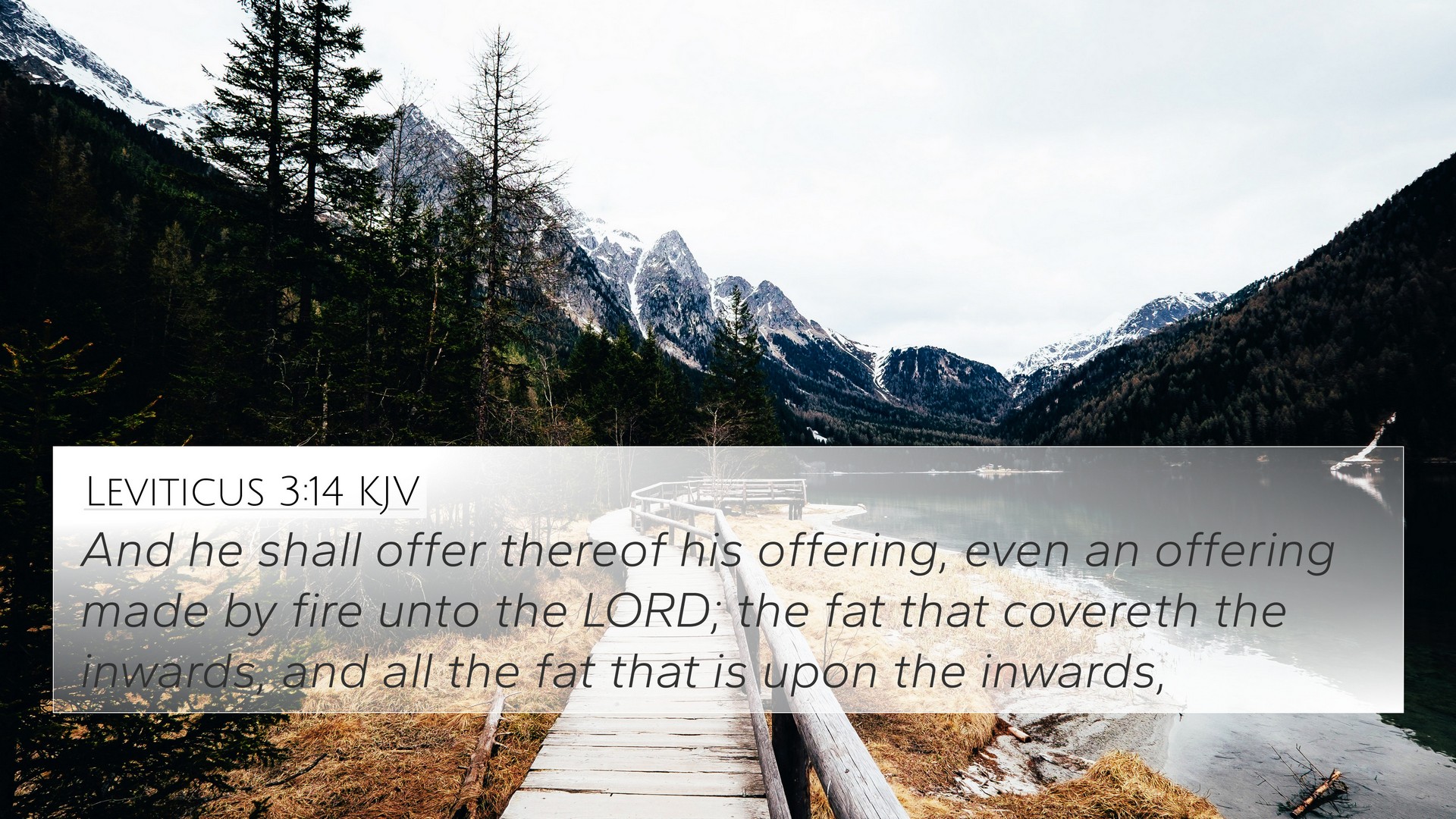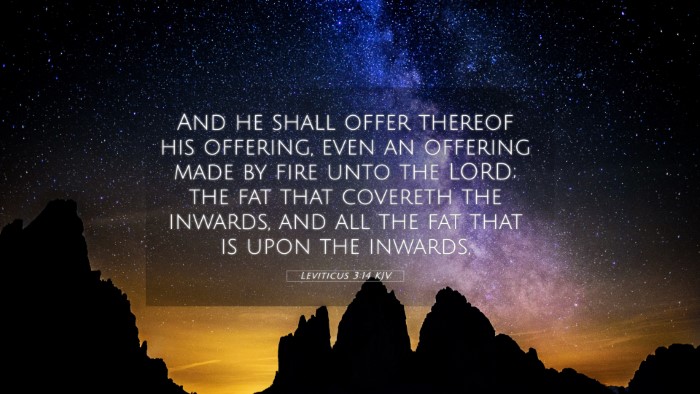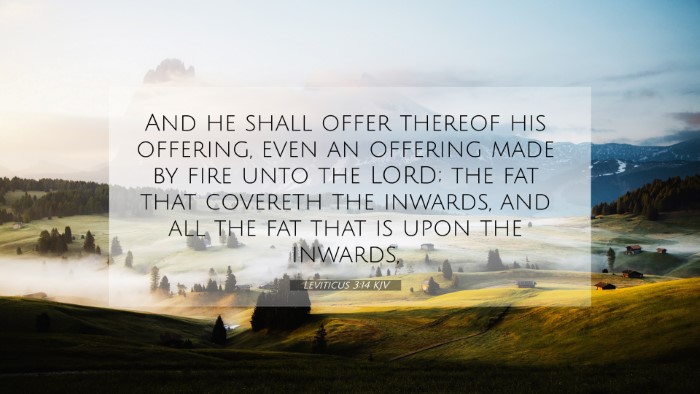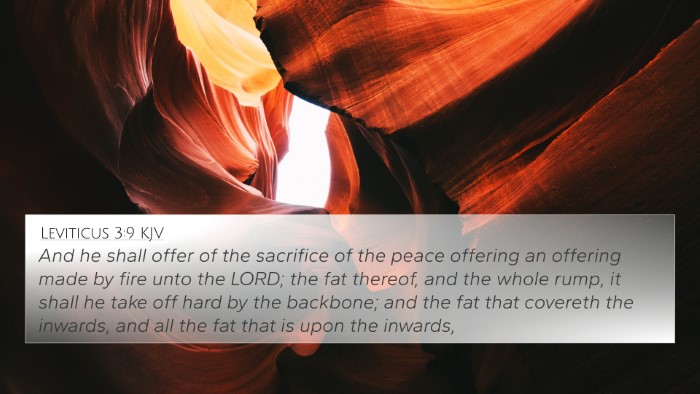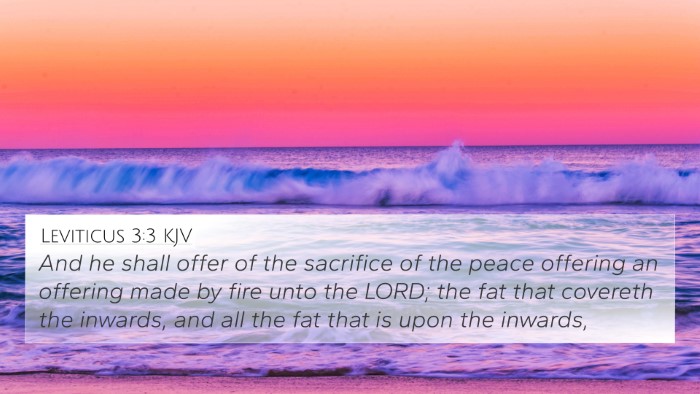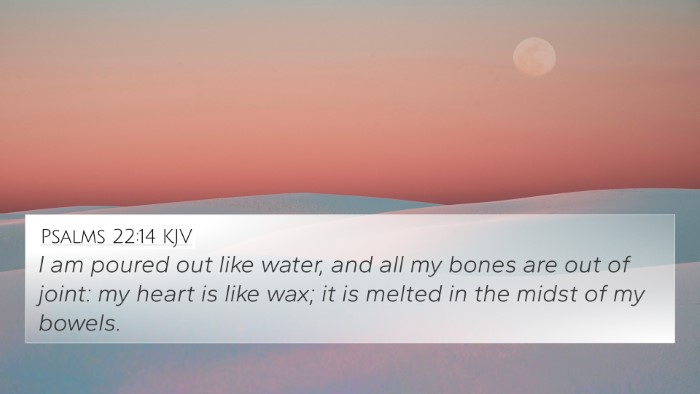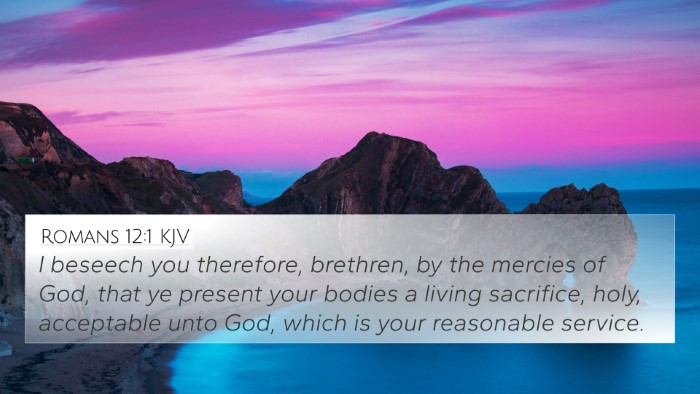Understanding Leviticus 3:14
Leviticus 3:14 states: "And he shall offer from it his offering, even an offering made by fire unto the Lord; the fat that covereth the inwards, and all the fat that is upon the inwards." This verse is a directive concerning the offerings made to God, detailing specific portions that are to be given for sacrificial purposes. It provides a glimpse into the sacrificial system established in the Law given to the Israelites.
Summarized Insights from Public Domain Commentaries
This verse emphasizes the significance of the fat, which was regarded as the finest portion of the animal. The following commentaries provide deeper insights into its meaning:
- Matthew Henry: Henry explains that the fat signifies the best and richest part, symbolizing giving one's best to God. The fat, being a symbol of abundance, indicates that offerings should be made from the best of one's resources to honor God.
- Albert Barnes: Barnes emphasizes the ritualistic aspect of the sacrifice. He notes that the offering, including the fat, was to ascend in smoke to the Lord, metaphorically representing the people's devotion and acknowledgment of God's sovereignty.
- Adam Clarke: Clarke expands on the purpose of the offerings, explaining that they served as a means of communion between God and the offerer. He highlights that the fat, as well as the other choice parts of the sacrifice, were to be dedicated to God, indicating a total commitment to divine service.
Bible Verse Cross-References
Leviticus 3:14 connects with numerous other Scriptures, showcasing a rich tapestry of offerings and sacrifices in Biblical theology. Here are some notable cross-references:
- Genesis 4:4: Abel brought of the firstborn of his flock and their fat portions, indicating the priority of offering the best to God.
- Leviticus 1:8: Details the role of priests in presenting the offerings, reflecting the structure of sacrificial worship.
- Exodus 29:18: Discusses the whole ram being burned as an offering, emphasizing the holistic dedication to God.
- Numbers 18:17: Specifies the prohibition against consuming the fat of sacrificial offerings, reinforcing its sacredness.
- Deuteronomy 12:17: Instructs the Israelites on appropriate places and manners of offering sacrifices, illustrating the importance of following divine instruction.
- Psalms 51:17: Highlights the notion of a broken spirit being more valuable than ritual offerings, encouraging true devotion over mere outward compliance.
- Hebrews 13:15: Connects the Old Testament practice of sacrifice with New Testament worship, suggesting that sacrifices of praise fulfill the intent of earlier offerings.
Connections Between Bible Verses
The connections between Leviticus 3:14 and these other verses reveal the importance of sacrificial worship throughout the entire Bible. They illustrate the thematic continuity in God’s expectations for offerings—where the focus is consistently placed on giving one's best to God as a mark of fidelity and reverence.
Comparative Bible Verse Analysis
When analyzing Leviticus 3:14 in comparison to other passages, we observe a clear narrative of how offerings are meant to symbolize a believer's relationship with God. The practice of offering fat could be viewed through the lens of spiritual sacrifice discussed in Romans 12:1, where believers are encouraged to present their bodies as living sacrifices holy and pleasing to God.
Cross-Referencing Bible Study Methods
Utilizing tools for Bible cross-referencing can enhance understanding of the Scriptures. Here are a few resources that can aid in this process:
- Bible concordances that list related verses
- Bible cross-reference guides for deeper insights
- Cross-reference Bible study worksheets for personal reflection
Understanding the connections between these scriptures aids in revealing a holistic view of Biblical teachings.
Inter-Biblical Dialogue
Leviticus 3:14 serves as a point of dialogue between the Old and New Testaments, illustrating continuity in themes of worship and sacrifice. As you study this chapter, consider the implications its rituals had for early Christians, who viewed Jesus as the ultimate sacrifice. The recurring theme of sacrifice from the Law set a precedent that culminates in Christ’s atoning work. This inter-Biblical dialogue fosters a richer understanding of spiritual practices and God's intentions for worship.
Conclusion
In summary, Leviticus 3:14 stands as a pivotal verse within the context of sacrificial worship. The detailed instructions regarding the offering of fat highlight the importance of dedicating one's best to God, a principle that resonates throughout Scripture. The connections made through various cross-references deepen our understanding and appreciation of the underlying themes of commitment, holiness, and spiritual connection to God.
